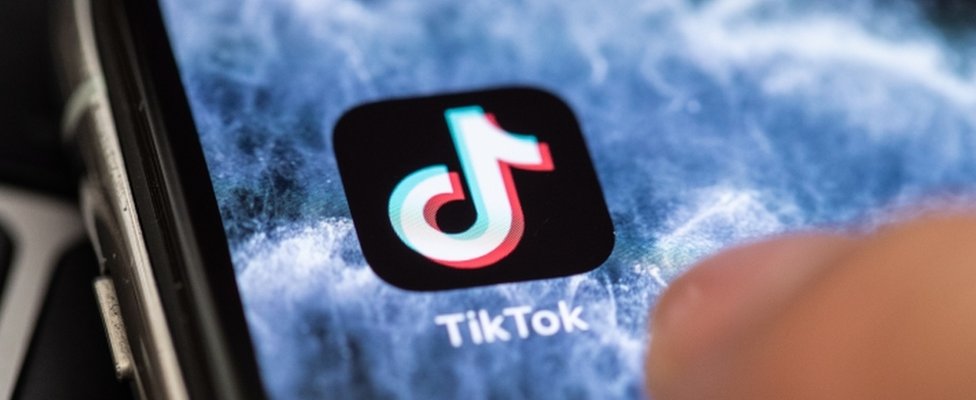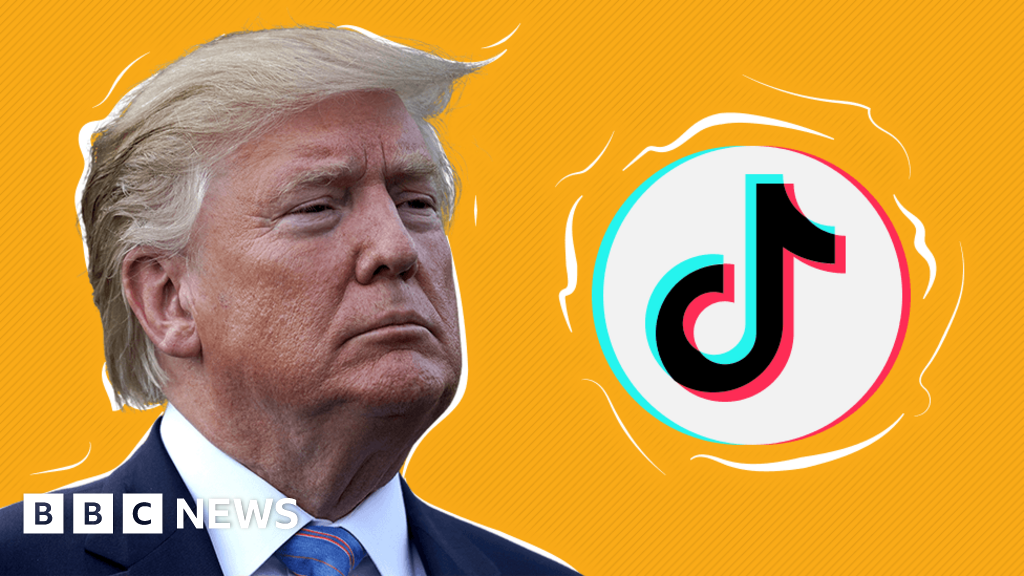By Leo Kelion
Technology desk editor
US tech firm Oracle has confirmed that TikTok’s owner has formally proposed it become a “trusted technology partner” to the video-sharing app.
Full details of the tie-up have yet to be disclosed, but the aim is to avoid President Trump’s threat to shut down the Chinese-owned service in the US.
Mr Trump has cited national security concerns, suggesting users’ data could be accessed by Beijing under current arrangements.
Current owner Bytedance denies this.
It says it has taken “extraordinary measures to protect the privacy and security of TikTok’s US user data”, which is stored in the States and Singapore.
Oracle is a database specialist without experience of running a social media app targeted at the general public.
Earlier in the day, US Treasury Secretary Steven Mnuchin said that the Trump administration had been contacted by the American firm to discuss plans to make TikTok a US-headquartered company. He said the White House intended to review the idea this week.
TikTok has released a statement that does not make direct reference to Oracle.
“We can confirm that we’ve submitted a proposal to the Treasury Department which we believe would resolve the administration’s security concerns,” it said.
“This proposal would enable us to continue supporting our community of 100 million people in the US who love TikTok for connection and entertainment, as well as the hundreds of thousands of small business owners and creators who rely upon TikTok to grow their livelihoods and build meaningful careers.”
Oracle’s shares were trading about 5% higher in lunchtime trade in New York.
“While I can see the upside for Oracle from a cloud perspective, it is hard not to think how much of this deal rests on politics rather than tech,” commented Carolina Milanesi from the Silicon Valley-based research firm Creative Strategies.
Oracle’s chairman, the billionaire Larry Ellison, is a supporter of Mr Trump and in February held a fundraiser at his California home to aid the Republican leader’s re-election campaign.
The White House is also taking a harsh line against other Chinese tech companies – including Huawei, Tencent and a number of artificial intelligence start-ups – restricting what business they can do with US counterparts without the administration’s approval.
President Trump had given TikTok’s owner Bytedance until this week to secure a deal.
Failure to do so would have seen US companies prevented from doing business with it from Sunday, and Bytedance being forced to give up TikTok’s US operations one way or another by 12 November.


Oracle was not the favourite to buy or otherwise link up to TikTok’s US arm – Microsoft was the early frontrunner.
But as time wore on, Microsoft became increasingly concerned about what it would be acquiring.
It became clear that China might attempt to block the sale of the technology behind the app’s powerful algorithm.
Privately there were concerns too that Microsoft was about to create a rod for its own back by becoming involved with a mass market, youth-focused social network – it already owns LinkedIn, but that caters for a very different audience.
Political bias, child safety issues and right-wing militias are just some of the problems TikTok has had to deal with in the last few months.
Even so, TikTok’s hundreds of millions of users make it an attractive proposition in a sector where size is everything: if all your friends are on a platform, you too are more likely to join.
Oracle has decided it’s worth the risk.
The big questions now are what exactly is Oracle’s involvement, and will the tie-up be approved by the US and Chinese authorities.



TikTok Timeline


image copyrightEPA
March 2012: Bytedance is established in China and launches Neihan Duanzi – an app to help Chinese users share memes
September 2016: Bytedance launches the short-form video app Douyin in China
August 2017: An international version of Douyin is launched under the brand TikTok in some parts of the world, but not the US at this time
November 2017: Bytedance buys lip-synch music app Musical.ly
May 2018: TikTok declared world’s most downloaded non-game iOS app over first three months of the year, by market research firm Sensor Tower
August 2018: Bytedance announces it is shutting down Musical.ly and is moving users over to TikTok
February 2019: TikTok fined in US over Musical.ly’s handling of under-13s’ data
October 2019: Facebook’s Mark Zuckerberg publicly criticises TikTok, accusing it of censoring protests
November 2019: The Committee on Foreign Investment in the United States (Cfius) opens national security investigation into TikTok
May 2020: TikTok hires Disney executive Kevin Meyer to become the division’s chief executive and chief operating officer of Bytedance
June 2020: India bans TikTok among dozens of other Chinese apps
July 2020: US Secretary of State Mike Pompeo, and then President Trump, say TikTok might be banned
August 2020: Microsoft and Oracle make rival approaches to acquire or otherwise operate TikTok in the US and three other markets. Mr Meyer announces he is leaving the company because the “political environment has sharply changed”
September 2020: TikTok says it has more than 100 million active users in Europe. It recently said it had a similar number in the US, and has been estimated to have more than 800 million engaged members worldwide

